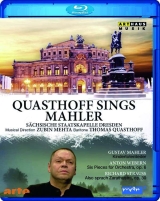 Quasthoff sings Mahler Gustav Mahler: Kindertotenlieder; Anton Webern: 6 Stücke für Orchester op. 6; Richard Strauss: Also sprach Zarathustra op. 30; Thomas Quasthoff, Bariton, Staatskapelle Dresden, Zubin Mehta; 1 Blu-ray Disc Arthaus Musik 109421; Stereo & Surround; Bild 16:9; Liveaufnahme 2010, Veröffentlichung 11/2020 (73') - Rezension von Remy Franck
Quasthoff sings Mahler Gustav Mahler: Kindertotenlieder; Anton Webern: 6 Stücke für Orchester op. 6; Richard Strauss: Also sprach Zarathustra op. 30; Thomas Quasthoff, Bariton, Staatskapelle Dresden, Zubin Mehta; 1 Blu-ray Disc Arthaus Musik 109421; Stereo & Surround; Bild 16:9; Liveaufnahme 2010, Veröffentlichung 11/2020 (73') - Rezension von Remy Franck
‘Quasthoff sings Mahler’, so lautet der etwas irreführende Titel dieser Veröffentlichung. Doch das ist nur ein Programmteil, ca. 25 Minuten lang. Die übrigen 50 Minuten gehören Zubin Mehta. Nicht dass er in den Mahler-Liedern nicht auf dem Podium gestanden hätte bei diesem Konzertmitschnitt aus der Semperoper. Nein, er stand schon da und bewegte auch die Arme. Aber als Interpret war er nicht da. Entsprechend uninspiriert klingt die Staatskapelle. Mehta überlässt alles Thomas Quasthoff. Und der singt sehr gut und sehr engagiert. Aber er steht allein auf verlorenem Posten. Schade!
Zwischen Mahler und Strauss gibt es Bergs Sechs Orchesterstücke. Mehta dirigiert sie ohne jegliches Raffinement. Schade!
Also sprach Zarathustra inszeniert der Dirigent als Klangorgie, nur am Spektakulären und am Glanz interessiert. Warum atmet er nicht mit der Musik und dem Orchester, warum differenziert er nicht die einzelnen Teile, warum lässt er quasi alles laut und sehr laut spielen? Schade!
‘Quasthoff sings Mahler’ is the somehow misleading title of this release. But this is only one part of the programme, about 25 minutes long. The other 50 minutes belong to Zubin Mehta. Not that he was not on the podium in the Mahler songs in this concert recording from the Semper Opera. No, he was already standing there and also moved his arms. Yet he acted not as an interpreter. The Staatskapelle sounds correspondingly uninspired. Mehta leaves everything to Thomas Quasthoff. And he sings very well and with great commitment. But he stands alone in a lost position. A pity!
Between Mahler and Strauss are Berg’s Six Orchestral Pieces. Mehta conducts them without any refinement. A pity!
Also sprach Zarathustra is staged essentially as a sound orgy, since Mehta seems to be interested only in the spectacular and brilliant side of the piece. Why doesn’t he breathe with the music and the orchestra, why doesn’t he differentiate between the individual parts, why does he make nearly everything play loud and very loud? A pity!






















